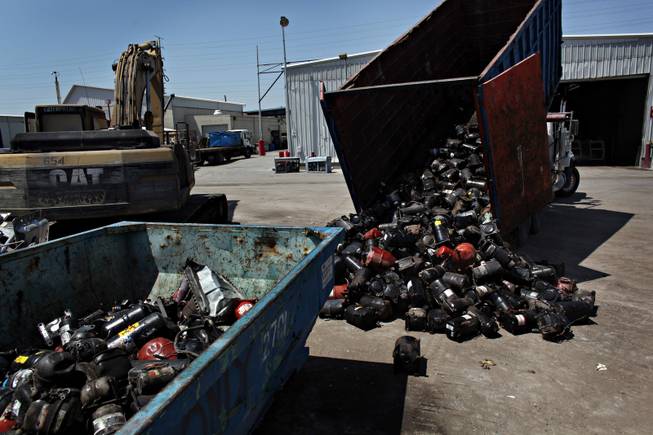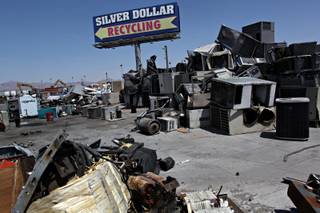
Residential and light commercial air conditioning unit compressors from a local air conditioning company are dumped at Silver Dollar Recycling in Las Vegas.
Saturday, Aug. 22, 2009 | 2 a.m.
The Smiths slept on their living room floor last week, a family of four camping in the coolest part of the house while they argued with an air-conditioning company about repairs.
The problem was the compressor, a critical component that does what it sounds like: compress coolant. The repair company, Air Pro Master, insisted the family pay $180 to have the compressor specially disposed of, claiming it contained hazardous materials.
The Smiths believed the fee was nonsense. Local air-conditioning experts agree.
“Nevada has no such disposal regulations,” said Blake Ballard, president of the Southern Nevada Air Conditioning Refrigeration Service Contractors Association. “Charging this type of a fee to a homeowner without justification would appear to us to be nothing more than a scam.”
But the Smiths were stuck with Air Pro, the contractor hired by their home warranty company. And they were sweltering. So they gave in, made the appointment and put up one last fight — just as the repairman was ready to leave.
You can call my manager, the repairman said after he was questioned about the fee.
The manager explained to Craig Smith, who asked that an alias be used for fear of retaliation, that he couldn’t even have the compressor in his car without a license from the Environmental Protection Agency. The manager, a man named Andre who later refused to give his last name to the Sun, then claimed the EPA was “cracking down” on companies like his, and that he faced a “huge, huge fine” if he let Smith have his used compressor.
“I can’t take the risk,” Andre said.
Smith signed away the $180, grudgingly.
In August Clark County residents can’t afford to ignore air-conditioning repairs, no matter what they cost. They are not just at the mercy of specialized technicians, they’re at the mercy of the desert.
“How many is this happening to?” Smith wondered.
There’s no way of really knowing. The Nevada Consumer Affairs Division, a state agency that used to investigate business fraud complaints, was shuttered in June because of budget cuts. Nobody at the Nevada State Contractors Board, which can discipline licensed contractors for fraud, could remember investigating this kind of complaint. Metro Police say they haven’t investigated any cases either.
But call around to local air-conditioning repair companies and you’ll hear that tales of technicians collecting the disposal fee are common in the industry. Moreover, take a tour of Clark County’s metal recycling yards, and you’ll see air-conditioning compressors piled up — sold for scrap at about 5 cents a pound. People are actually paid to get rid of used compressors.
When the Sun asked Andre of Air Pro whether charging clients a disposal fee was a scam, he objected, insisting that the compressor contains Freon, which must be specially handled.
But Ballard says there is no way to remove or change a compressor without also removing a majority of the refrigerant inside. The EPA recognizes whatever refrigerant might be left behind is “de minimus” — so minute it’s not worth regulating.
In other words, Ballard said, you could throw a used compressor in the garbage without fear.
Consumers who feel like they are being scammed by licensed air-conditioning contractors can file a complaint with the State Contractors Board. But since the Smiths haven’t filed a complaint, at least not yet, no one is investigating this particular case.
The EPA can fine companies that mishandle refrigerants, releasing Freon into the air, for example. And there is a fee to dispose Freon, which is collected in a separate tank when compressors are replaced. The chemical contents of that tank, not the compressor, cost about $5 for a company to properly dispose of, Ballard said.
“There is no law that requires any kind of special disposal of a compressor that no longer contains refrigerant,” Ballard said. “And it’s impossible to remove a compressor from a system without removing the refrigerant.”
Smith knew this. He had friends who did air-conditioning work, and they told him as much.
But Air Pro wouldn’t budge. So the family is sleeping in their own beds again, air-conditioned and angry.


Join the Discussion:
Check this out for a full explanation of our conversion to the LiveFyre commenting system and instructions on how to sign up for an account.
Full comments policy